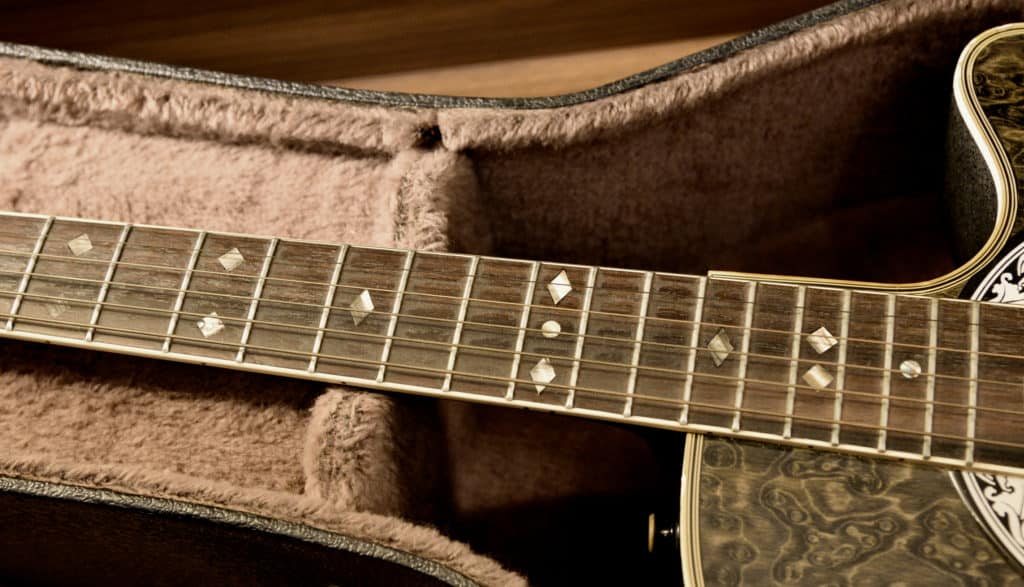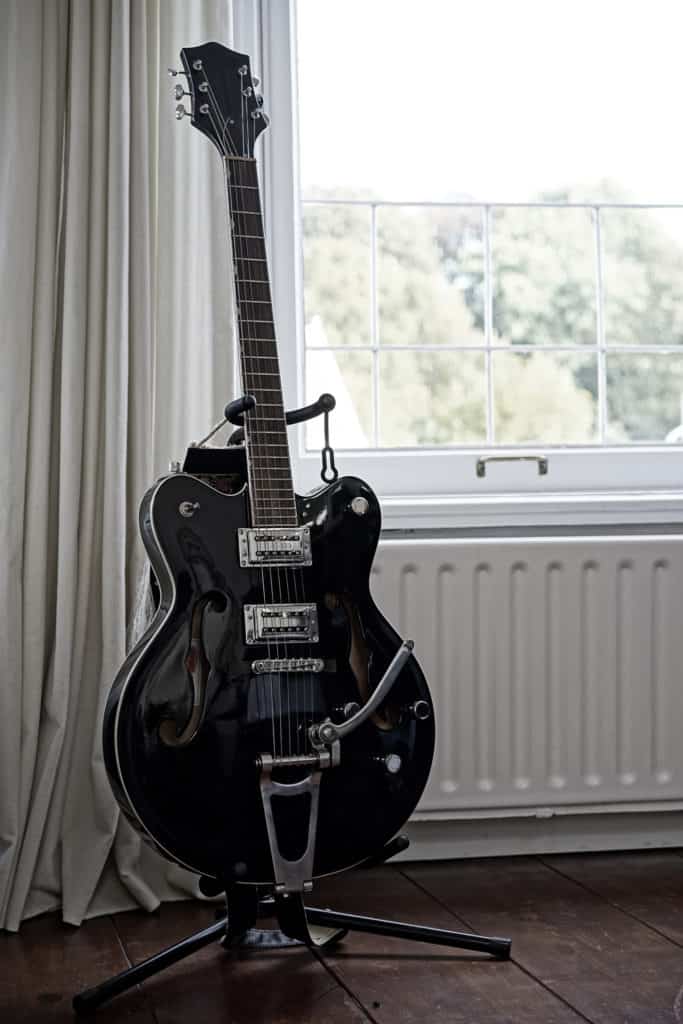A guitarist who knows the importance of maintaining his or her acoustic guitar will be able to use it for a long time. Poor handling, storage, and lack of consistent servicing will shorten the lifespan of an acoustic guitar. Acoustic guitars can last for a lifetime, depending on the quality of the model and the servicing put into it, among other factors.
Acoustic guitars typically last around 10 years on average. Poorly maintained acoustic guitars will not last that long, but when maintained well, even cheaper acoustic models can last for up to 30 years. Higher-end acoustic models can last a lifetime, but they require proper maintenance and good care.
It’s not enough to say an acoustic guitar can last for this or that number of years. That is just the average you should expect your acoustic guitar to last when it is properly maintained. The lifetime is dependent on many factors that we shall discuss below. Read on to find out which acoustic guitar brands and models have reputations for lasting longer and then we will discuss what kind of maintenance your acoustic guitar will require.
Which Acoustic Guitars Last Longer?
One reason you could say it is a great time to get interested in acoustic guitars is because of the sheer number of guitar makers in the space right now. There are so many options to choose from when looking at an acoustic guitar, but how do different acoustics compare in terms of lifespan?
Obviously, more expensive acoustic guitars such as Martin, Gibson, and Collings are known for phenomenal handiwork, and they have well-deserved reputations for being extremely reliable. On the other hand, these guitars can easily cost several thousand dollars and are therefore, relatively uneconomical for many guitar players. But that does not mean that a cheaper guitar won’t also last a while. You can check out this in-depth article on buying a cheap guitar here.
Our recommendation for a fair-priced acoustic guitar that will last a long time is Alvarez. Alvarez is one of the most underrated guitar brands out there, but they truly make an outstanding guitar at a cost typically running around $600 and under. They tend to be extremely well built, have long longevity, and are typically rated highly for sound quality. I was sold on an Alvarez Dreadnought four or five years ago and have been playing it ever since.
If you are in the market for a high-quality guitar under $700 you can check out this article here.
What Maintenance Do Acoustic Guitars Require?
All guitars require some level of maintenance, and acoustic guitars are no different in this regard. If we want to get the full lifespan out of our guitar then we need to follow some basic maintenance and storage rules to keep our acoustics in good playing shape.
Guitar strings wear with time and require relatively frequent replacement. Generally, strings on an acoustic guitar will need to be replaced every 3 months (even if you’re not using it).
The acoustic guitar body and fretboard need regular cleaning. Think of all the sweat and oil that you will get on your guitar with 30 hours of playtime. Luckily, keeping your guitar body and fretboard in clean shape is relatively simple. You will need some cotton swabs or a lint-free cloth, stay away from paper towels though as they can scratch the finish. Cleaners are not a necessity unless you have a really tough smudge but make sure that you wipe off any remaining cleaner or water once you are done.
The fretboard can also dry out over time if you don’t apply oil from time to time. Generally, it is recommended to oil your fretboard once every six months with linseed oil or another fretboard oil sold on the market.
Store Your Guitar Properly Long Term

If you are going to store your acoustic guitar for a long time, then you need to store it properly. Your acoustic guitar will develop wear and tear even without you constantly playing it. This is because the weather conditions can affect the wood, or make the glue on the joints separate.
The main points you need to be aware of for long-term storage is that you need to keep your acoustic guitar away from too much humidity, and from significant and frequent temperature variations.
Storing the guitar in the long term requires that you detune the strings, typically this is done by taking them down a whole step. Leaving them tight may pull the neck of the guitar forward due to changing conditions and cause damage to it.
Cleaning the guitar before storage is also a recommended practice. After cleaning, put it in a large plastic bag before putting it in the guitar bag. Always use a strong case with a small bag of silica that will help absorb excess moisture. After packing it well, place it in a relatively dry, cool, and safe place.
Store Your Acoustic Guitar Properly Short Term

Storing your guitar properly means a lot when it comes to durability. We have already discussed the steps you should take when storing your guitar long-term, but there are a few things to keep in mind when you frequently use your guitar.
The absolute best way to store your guitar when you are not playing it is in a closed hard case. Gig bags and chipboard cases are okay, but a hard case is certainly preferred.
A stand is a solid option for short-term storage. Some people may be tempted to hang their guitar on the wall. I know, it looks really cool and everyone entering your home can see your nice guitar, but I would strongly recommend using the stand instead. Stands are really inexpensive, (you can buy them for less than $50) and you will never have to worry about your guitar falling from the wall. You can check out a really popular stand here.
Full body cleaning
Cleaning your acoustic guitar is one of the ways to make it last longer. You need to ensure that you have a regular cleaning routine. You should also get into the habit of inspecting your guitar from time to time after you wrap up a jam session. A quick inspection for dirt or dust will pay dividends down the road.
When it comes to cleaning, you should always use the recommended cleaner suitable for your acoustic guitar. Always remember that you are in for a lot of trouble if you leave moisture on your wooden guitar. Always clean any residual liquid off with a dry cloth.
Change the strings regularly
Even though guitar strings are changed relatively frequently, you still need to keep them clean. OIl from your fingers and other residues will get on your strings and unfortunately, the sound is very easily dampened when they are coated with a little bit of residue. Luckily, cleaning strings is a pretty simple task, but there are a few things to remember.
Never use any household cleaners like soap to clean guitar strings. You risk drying out the fretboard or coating your strings in a substance that you can’t get off.
My recommendation is that you use a microfiber cloth. These cloths do not leave any residue or lint. You can also use a guitar string cleaner with your cloth, you can pick these up at any local music store or on Amazon.
What Humidity Should Acoustic Guitars Be Kept At?
Acoustic guitars should be kept at 45 – 55% humidity level. Outside this level of humidity, your guitar may get damaged as it gets exposed to humidity outside of its comfort range. Keeping your acoustic guitar at recommended humidity levels will ensure that your guitar lasts a long time.
Humidity is a problem but extreme heat can also cause trouble for your acoustic guitar.
It’s not only humidity that causes potential harm to your guitar, but also extreme temperatures. Extreme temperatures will cause your guitar to expand and contract dramatically. This will result in cracking or warping. A proper hard case will help alleviate this issue, but keeping your guitar in a temperature-controlled home is by far the best solution.
Do Older Acoustic Guitars Sound Better?

It doesn’t really matter how long your acoustic guitar can last if the sound is going to degrade as it ages. Luckily, for most people, the sound on an acoustic guitar actually improves with age.
The reason behind this is that as the wood ages with time, it becomes harder and lighter since the water-soluble sugars that form the cell wall of the wood break down. When the wood becomes harder and lighter, it develops a more resonant tone that has better sustain, a necessary ingredient to make any acoustic guitar sound good.
Apart from sounding better, an acoustic guitar also gets a little louder as it ages. This is due to string break angle changes at the saddle as well as the high action that occurs due to the warping of the guitar neck.
Conclusion
Whether you own a cheap or an expensive acoustic guitar, it can last a long time if you take good care of it. You should expect your guitar to last 10 – 30 years if properly maintained. On the other hand, guitars that are poorly maintained often last a fraction of their normal lifespan. It is also important to note that there are higher-end acoustic models that can last a lifetime if properly taken care of.
